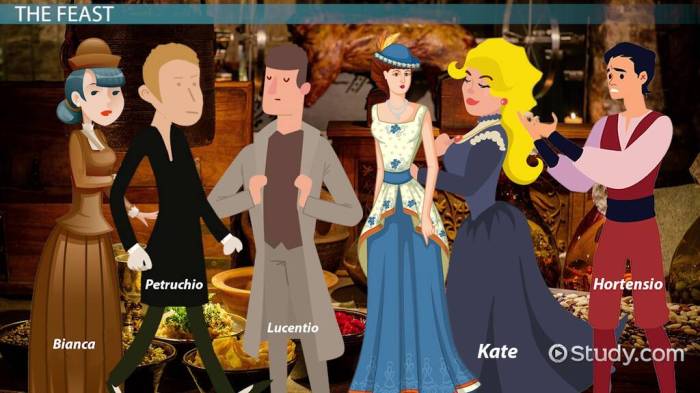Act 5 taming of the shrew – Act 5 of “The Taming of the Shrew” marks a pivotal turning point in the play, offering a captivating exploration of marital dynamics and the complexities of gender roles. With its engaging narrative and thought-provoking themes, this act provides a rich tapestry of insights into the nature of love, power, and societal expectations.
Petruchio’s speech on the duties of a wife sets the stage for a humorous and thought-provoking examination of gender roles, while Katherina’s final speech challenges traditional norms and invites us to question the societal expectations placed upon women.
Act 5, Scene 1
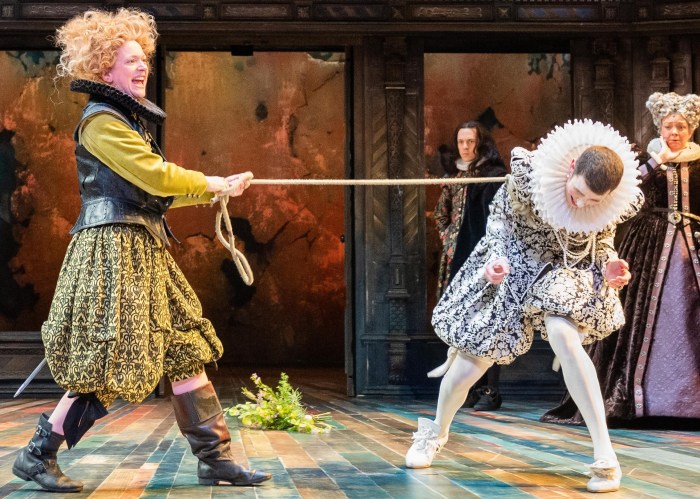
The play concludes with a gathering of all the characters at Petruchio’s country house. Petruchio delivers a speech on the duties of a wife, arguing that she should be obedient and submissive to her husband. This speech has been interpreted in various ways, with some seeing it as a reflection of the patriarchal values of the time, while others view it as a satirical critique of those values.
The scene also features a contest between the wives to determine who is the most obedient. Petruchio’s wife, Katherina, emerges as the winner, much to the chagrin of the other husbands. The scene ends with a dance and a song, celebrating the triumph of Petruchio and Katherina.
Petruchio’s Speech on the Duties of a Wife
Petruchio’s speech is a lengthy and elaborate defense of the traditional view of marriage, in which the husband is the master and the wife is the servant. He argues that a wife should be obedient to her husband in all things, even if it means sacrificing her own desires.
He also claims that a wife should be chaste, faithful, and respectful of her husband.
Petruchio’s speech has been criticized by some feminists as being misogynistic and oppressive. However, it is important to remember that the speech is a product of its time. In the Elizabethan era, it was widely believed that women were inferior to men and that they should be subservient to their husbands.
The Use of Humor in the Scene
Despite the serious subject matter, Act 5, Scene 1 is also full of humor. This humor is often derived from the characters’ exaggerated behavior and the witty dialogue. For example, when Petruchio orders his wife to dance, she initially refuses.
However, he eventually persuades her by threatening to beat her. This scene is both funny and disturbing, and it highlights the complex relationship between Petruchio and Katherina.
Act 5, Scene 2
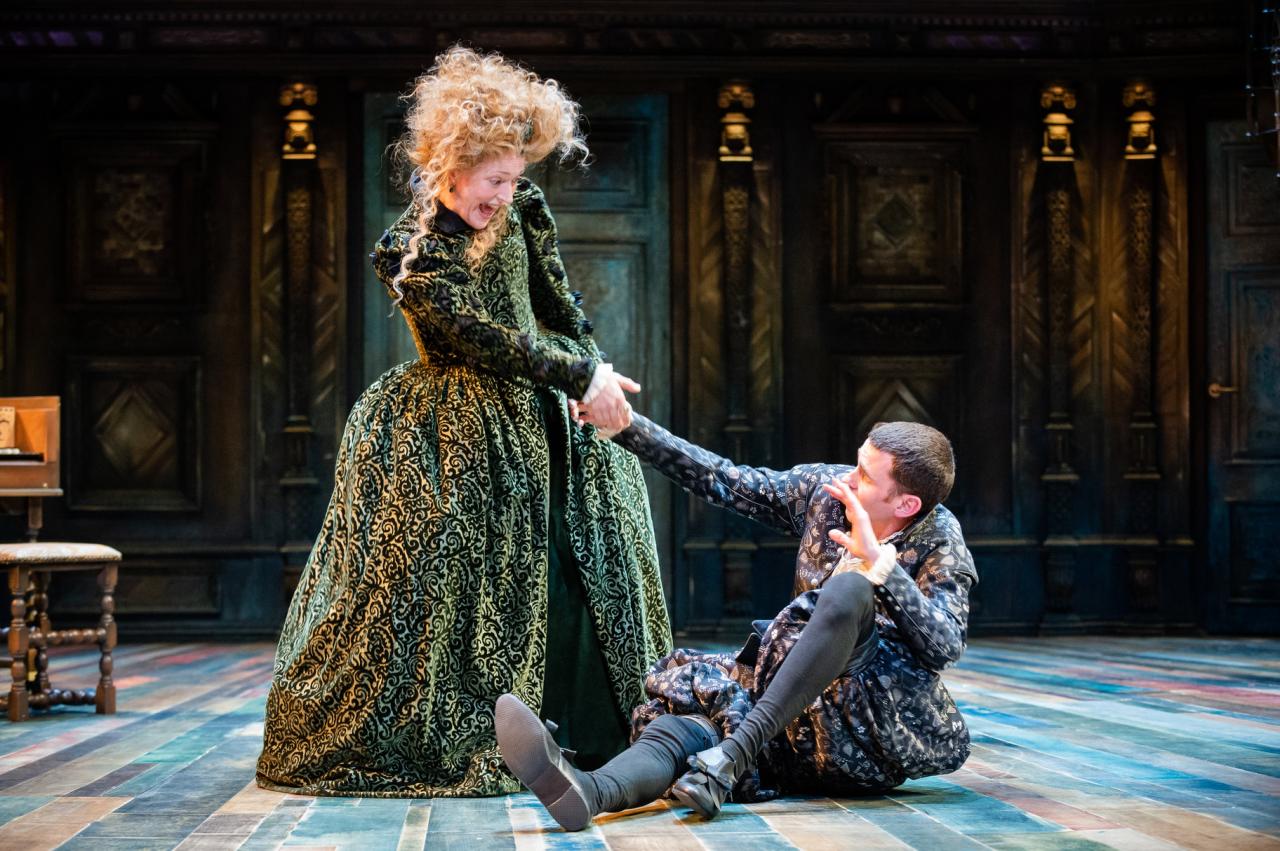
In this scene, Petruchio, Hortensio, and Lucentio engage in a wager about whose wife is the most obedient. Petruchio claims that Katherina is the most submissive, while Hortensio and Lucentio believe their wives are more compliant.
The Wager
The wager involves a test of obedience. Each husband will call his wife and command her to do something. The wife who obeys her husband’s command the most quickly and willingly will be declared the winner.
The Resolution
When the wives are called, Katherina immediately obeys Petruchio’s command to fetch a cap and mantle. Hortensio’s wife, on the other hand, hesitates before fetching a lute, and Lucentio’s wife refuses to come at all. As a result, Petruchio wins the wager.
Character Analysis
This scene provides further insight into the characters of Petruchio and Katherina. Petruchio is portrayed as a dominant and assertive husband who expects complete obedience from his wife. Katherina, on the other hand, is shown to be a strong-willed and independent woman who is gradually learning to accept her husband’s authority.
Act 5, Scene 3
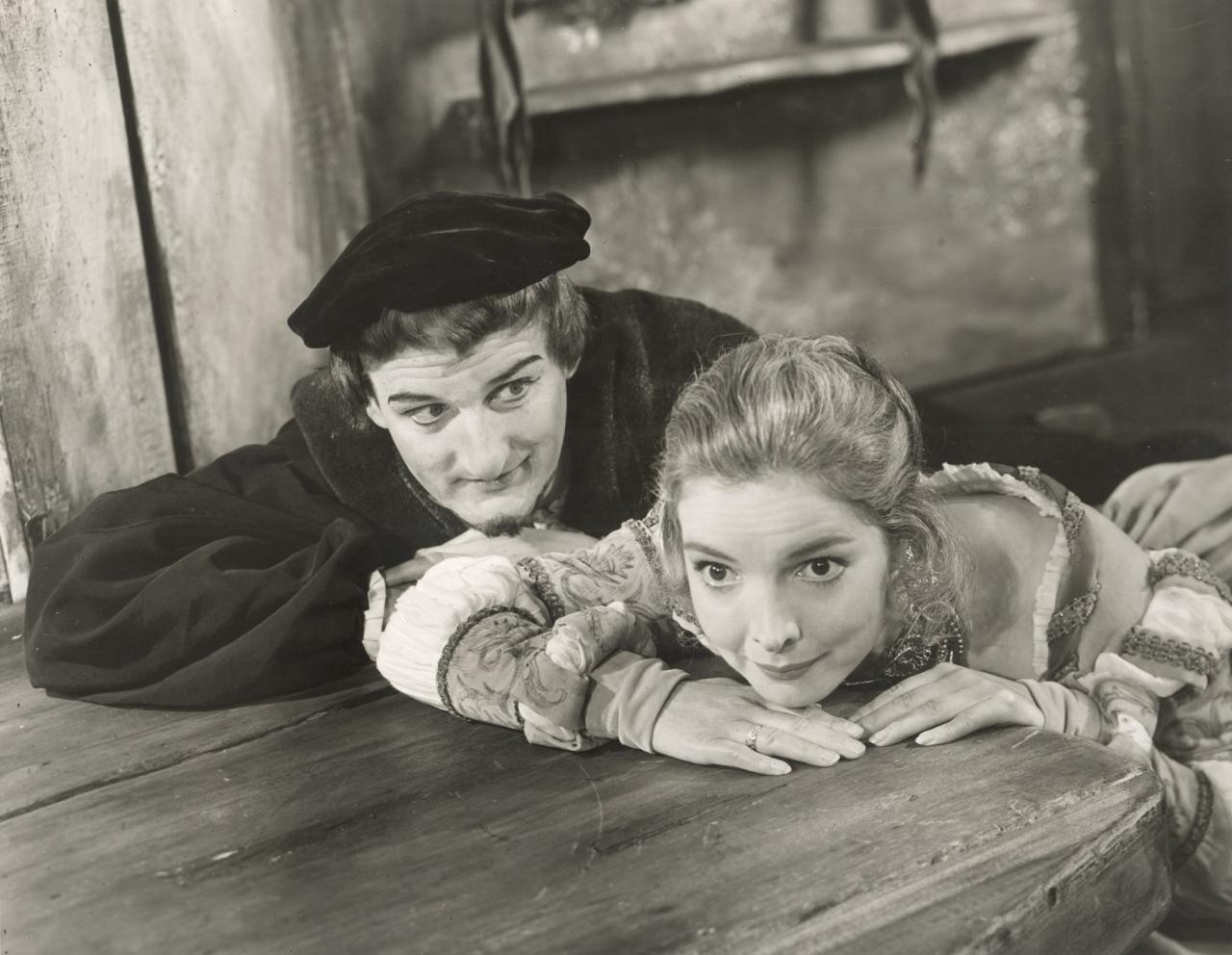
The final scene of The Taming of the Shrewfeatures a speech by Katherina that has been widely interpreted as a challenge to traditional gender roles. In this speech, Katherina asserts her authority over her husband, Petruchio, and argues that women are capable of being as intelligent and capable as men.
Use of Imagery and Metaphor
Katherina’s speech is full of vivid imagery and metaphor. She compares herself to a “falcon” that has been “tamed” by Petruchio, but she also insists that she is still a “wild bird” that cannot be fully controlled. This imagery suggests that while Katherina has learned to conform to the expectations of society, she has not lost her independence or her spirit.
Katherina also uses the metaphor of a “ship” to describe her relationship with Petruchio. She says that she is the “captain” of this ship, and that Petruchio is merely her “pilot.” This metaphor suggests that Katherina is in control of her own life, and that she will not allow Petruchio to dominate her.
Challenge to Traditional Gender Roles
Katherina’s speech is a direct challenge to the traditional gender roles of her time. In the Elizabethan era, women were expected to be subservient to their husbands, and they were not supposed to speak out or express their own opinions.
Katherina’s speech defies these expectations, and it shows that she is not willing to conform to the limitations that society has placed on her.
Katherina’s speech has been interpreted in many different ways over the centuries. Some critics have argued that it is a feminist speech that celebrates the power and independence of women. Others have argued that it is a more conservative speech that ultimately reinforces the traditional gender roles of the time.
Regardless of how it is interpreted, Katherina’s speech is a powerful and moving statement about the importance of female empowerment.
Themes in Act 5
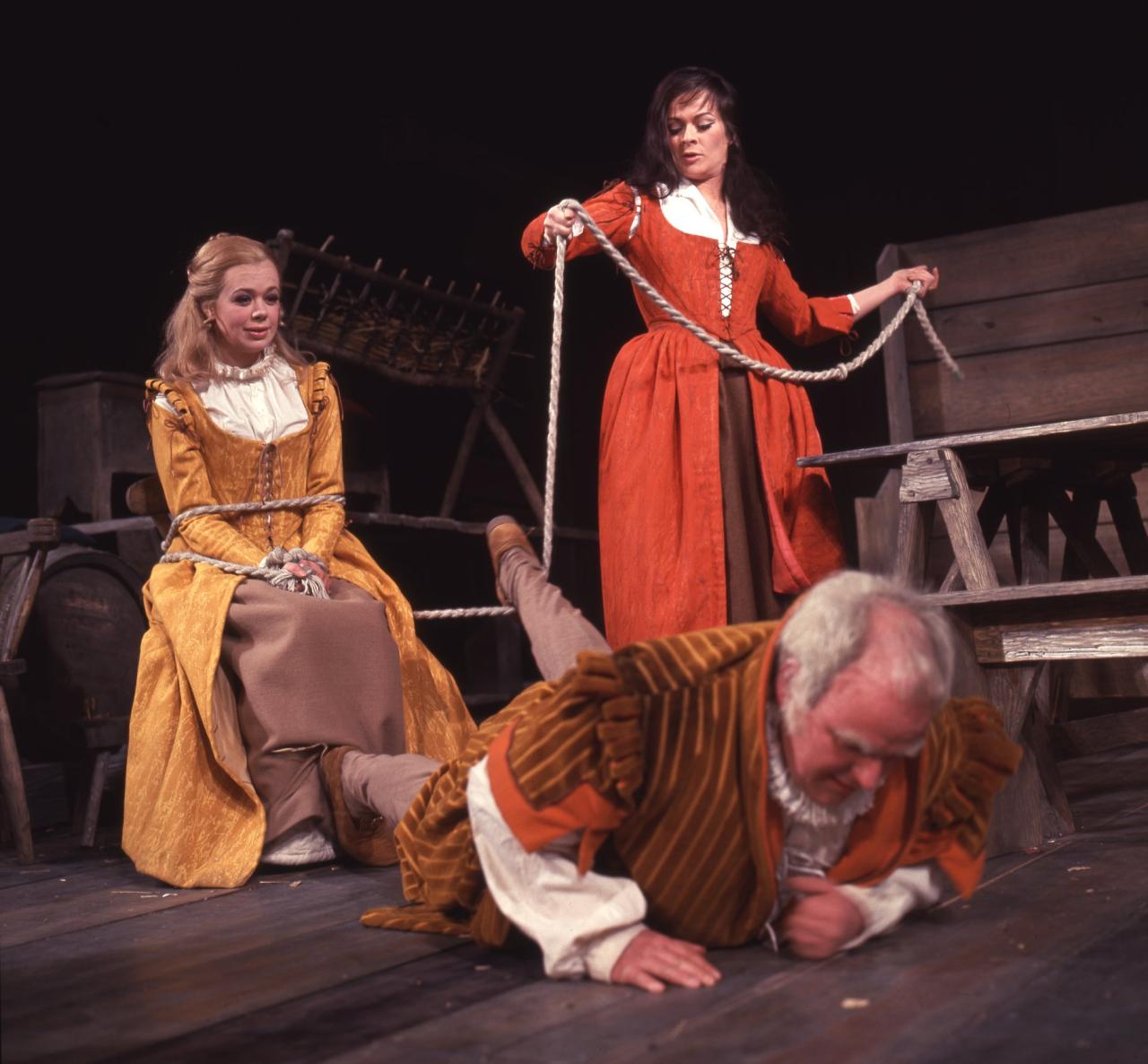
Act 5 of The Taming of the Shrewexplores several significant themes that have been developed throughout the play. These themes contribute to the play’s overall message and meaning, providing insights into the characters, relationships, and social norms of the time.
In Act 5 of The Taming of the Shrew, Katherine’s transformation is complete as she delivers a witty and eloquent speech on wifely obedience. Her words echo the sentiments of the Los Pinero de Nueva York , a group of Puerto Rican playwrights who explored themes of identity and cultural assimilation in their works.
Katherine’s speech, like their plays, challenges traditional gender roles and invites reflection on the complexities of marriage and submission.
Gender Roles and Relationships
Throughout the play, the theme of gender roles and relationships is central. The play challenges traditional gender expectations and explores the power dynamics between men and women. In Act 5, this theme is further developed through the subplot involving Bianca and Lucentio.
Bianca’s marriage to Lucentio is portrayed as a more traditional and harmonious relationship, in contrast to the tumultuous relationship between Petruchio and Kate.
The play also examines the nature of love and marriage. Through the relationship between Petruchio and Kate, the play suggests that love can transform and overcome even the most challenging obstacles. Petruchio’s initial harsh treatment of Kate is ultimately revealed to be a strategy to tame her wild spirit and bring her to a place of submission.
Social Class and Identity, Act 5 taming of the shrew
Another important theme in Act 5 is that of social class and identity. The play explores the differences between the upper and lower classes and the challenges faced by those who attempt to cross these boundaries. The subplot involving Tranio and Lucentio highlights the importance of social status and the lengths to which some people will go to achieve it.
The play also examines the role of disguise and deception in shaping identity. Lucentio’s disguise as a tutor allows him to gain access to Bianca and pursue his romantic goals. However, this deception also leads to complications and ultimately threatens to expose his true identity.
The Nature of Reality
Finally, Act 5 explores the theme of the nature of reality. The play’s final scene is a dream sequence in which Petruchio and Kate are transported to a world where their roles are reversed. This dream challenges the audience’s perception of what is real and what is imagined.
The play also explores the power of language and the ways in which it can shape our perceptions of reality. Petruchio’s manipulation of language allows him to control Kate and ultimately tame her. However, Kate’s final speech in the play suggests that she has ultimately found her own voice and will no longer be silenced.
Characters in Act 5: Act 5 Taming Of The Shrew
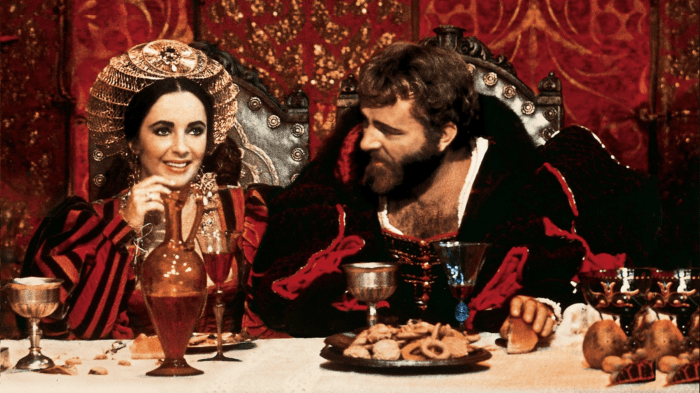
Petruchio’s Character Development
In Act 5, Petruchio’s character undergoes significant development. He finally realizes the error of his ways and apologizes to Katherina for his cruel treatment of her. He also acknowledges that she is a strong and independent woman who deserves his respect.
This change in Petruchio is a result of Katherina’s influence on him. She has taught him the value of patience and understanding, and she has shown him that a woman can be both strong and submissive.
Katherina’s Character Transformation
Katherina’s character also changes significantly throughout the play. At the beginning of the play, she is a shrewish and ill-tempered woman who is constantly arguing with her father and sisters. However, as the play progresses, she begins to soften towards Petruchio.
She eventually comes to love him and to appreciate his patience and understanding. This change in Katherina is a result of Petruchio’s influence on her. He has taught her the value of respect and submission, and he has shown her that a man can be both strong and loving.
Role of Supporting Characters
The supporting characters in Act 5 play an important role in the resolution of the play. Baptista, Katherina’s father, is a wise and compassionate man who helps to mediate the conflict between Katherina and Petruchio. Bianca, Katherina’s younger sister, is a gentle and loving woman who provides a contrast to Katherina’s shrewish nature.
Lucentio, Bianca’s suitor, is a kind and intelligent man who helps to bring about the reconciliation between Katherina and Petruchio.
Q&A
What is the significance of Petruchio’s speech on the duties of a wife?
Petruchio’s speech Artikels his expectations for Katherina as a wife, emphasizing her obedience and submission. It sets the stage for the power struggle between the two characters and highlights the traditional gender roles of the time.
How does Katherina’s final speech challenge traditional gender roles?
In her final speech, Katherina argues that women are not inferior to men and should be treated with respect. She challenges the idea that women should be subservient to their husbands and advocates for their right to have a voice and make their own choices.
